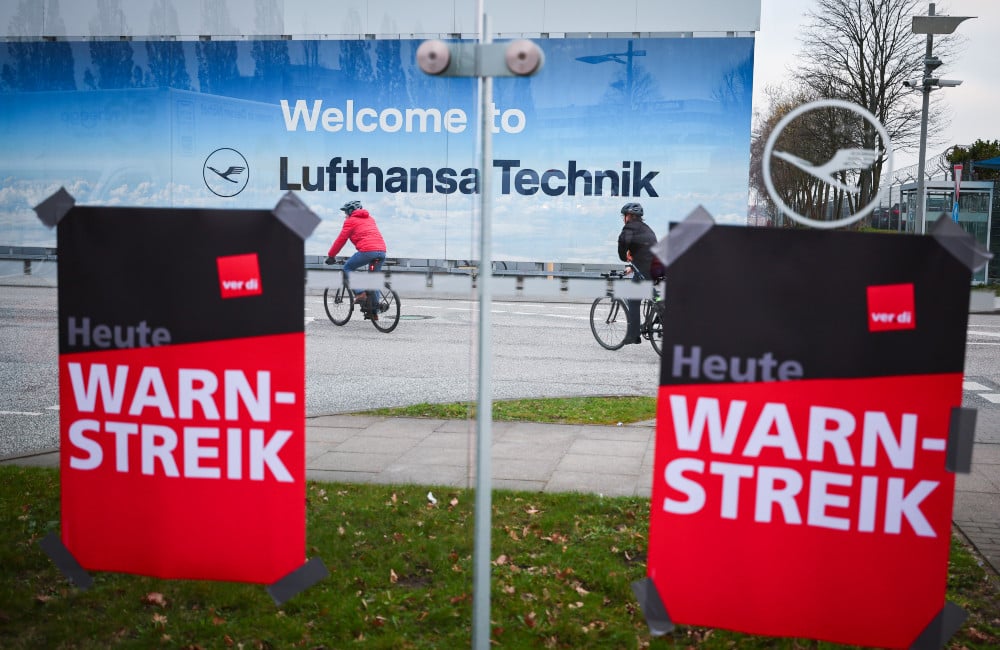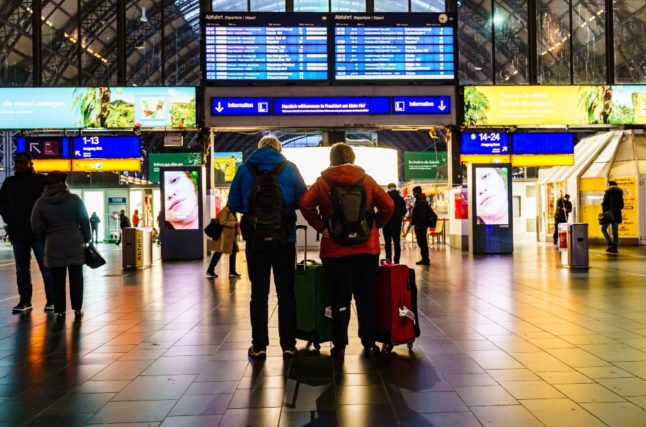Germany has been troubled by strikes for months as workers and management wrestle over terms amid high inflation and weak business activity.
Industrial action has hit the transport sector, supermarkets and the civil service.
Rail workers began a 35-hour strike on freight services at 6 pm on Wednesday and on passenger services at 2 am on Thursday morning.
The length of the strike is intended to underline a key ask of the GDL train drivers union to reduce the working week to 35 hours from 38.
As with the previous strikes, the company has set up a severely restricted timetable, meaning that around one in five long-distance trains is still in service, with wide regional variations.
The strike is officially set to last until 1 pm Friday, but the restricted timetable will be in use the whole day. Starting Saturday Deutsche Bahn intends to start normal train service again.
“DB’s Intercity and ICE trains will then be quite full then,” said spokesperson Achim Stauß, who recommended reserving seats at the weekend, especially for Saturday.
Reinhard Ligocki, who finally arrived at Berlin’s main station on a train from the Ruhr Valley, said that average Germans kept getting caught in the middle of an increasingly bitter conflict.
“Negotiators for the two sides shouldn’t take out their long-running dispute on the passengers,” he said.
READ ALSO:
- What passengers in Germany need to know about latest airport strikes
- ‘Rail is no longer reliable’: How latest German train strikes will hit services
‘No longer reliable’
Rail employees have been staging repeated strikes to demand a pay rise to help members manage the higher cost of living in light of inflation.
A walkout by train drivers in January caused travel disruption for thousands of passengers over several days.
That more limited walkout was the beginning of a “wave of strikes”, GDL boss Claus Weselsky said this week.
Future action would be announced “when we think the time is right” and no longer 48 hours in advance as has been the case in the past, Weselsky said.
“Rail is no longer a reliable means of transport”, with strikes due to drag on, he warned.
Rail operator Deutsche Bahn has condemned the walkout, saying it has made concessions amounting to a 13-percent pay increase.
Weselsky’s hard line has come in for criticism, with Transport Minister Volker Wissing saying he was losing patience with the industrial action.
“Those who exercise their right to strike also have to take responsibility and that means negotiating constructively,” he told ARD public television.
‘Damaging’ impact
Meanwhile Lufthansa ground staff held a nationwide strike from 4 am on Thursday due to last until 7:10 am Saturday. The company said it was only able to maintain about “10 to 20 percent of the flight schedule”.

Frankfurt, Germany’s biggest aviation hub, would see “major disruptions and flight cancellations throughout the day”, the airport said in a statement, adding it would be closed to all outbound passengers.
An unannounced strike by security staff at Düsseldorf airport triggered further chaos, with passengers stuck in massive queues and a rash of flights cancelled.
The Lufthansa strike is expected to cause further problems for the airline’s services at other airports.
A previous one-day strike affected some 100,000 passengers, with between 80 and 90 percent of flights grounded.
Workers’ representatives and management have blamed each other for the travel disruption.
The Verdi union is seeking pay rises of 12.5 percent for workers, a minimum of €500 more a month.
Lufthansa has offered pay increases over an extended period but not enough to meet Verdi’s demands, the union has said.
The carrier reported record 2023 profits on Thursday but warned about the “damaging” impact of the wave of industrial action at the start of this year.
Following ground staff, cabin crews were expected to stage their own strike in the coming weeks after pay talks broke down on Wednesday.
READ ALSO: Germany’s Lufthansa more than doubles profits as strikes cast shadow



 Please whitelist us to continue reading.
Please whitelist us to continue reading.
Member comments